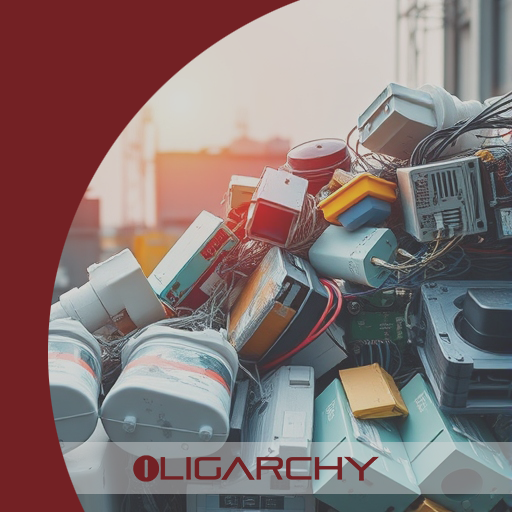Waste Management in Asia's IT & Medical Sectors
As Asia continues to be a global leader in both the IT and medical industries, the importance of secure and environmentally responsible asset disposal services cannot be overstated. By partnering with certified disposal providers, organizations in Asia can ensure compliance with local and international regulations, reduce the environmental footprint of their operations, and recover value from outdated assets. These services are vital in navigating the complexities of hazardous waste management, ensuring data security, and promoting sustainability in the face of rapid industrialization.
IT ASSET MANAGEMENT IT ASSET DISPOSITION (ITAD)


IT Asset Management | IT Asset Disposition (ITAD)
Navigating Compliance, Sustainability, & Risk Mitigation
In Asia’s rapidly evolving IT and medical industries, asset disposal services and hazardous waste management play an increasingly vital role. As clinical trials, medical equipment manufacturing, and IT sectors face growing regulatory scrutiny, secure and environmentally responsible disposal of outdated assets and hazardous materials is not just a necessity—it is a strategic imperative. Proper disposal processes are crucial for maintaining compliance with stringent laws, safeguarding public health, and contributing to sustainability efforts across the region.
Impact of Asset Disposal Services on the IT and Medical Industries in Asia
As Asia becomes a global hub for both medical advancements and IT innovation, managing outdated equipment and hazardous waste becomes increasingly complex. Asset disposal services ensure that organizations in these sectors handle hazardous materials and obsolete technology in a way that reduces environmental impact, secures sensitive data, and recovers valuable resources. Both clinical trial companies and medical equipment manufacturers in Asia must navigate a regulatory landscape that requires them to comply with strict environmental standards, secure sensitive data, and adhere to health and safety guidelines.
Key Challenges in the Asia-Pacific Region
Regulatory Compliance: Asia’s regulatory environment varies across countries but has become more harmonized over recent years, particularly regarding electronic waste (e-waste) and medical device disposal. The region is home to a wide variety of standards, such as the WEEE (Waste Electrical and Electronic Equipment) Directive in Japan and RoHS (Restriction of Hazardous Substances) regulations in South Korea, as well as local laws governing the disposal of medical and pharmaceutical waste. Asset disposal services ensure compliance with these diverse and evolving standards.
Growing Demand for Sustainable Practices: With growing awareness about sustainability, there is increased pressure from governments, stakeholders, and consumers for companies to adopt responsible disposal practices. This is particularly important in emerging markets like China, India, and Southeast Asia, where waste management infrastructure may still be underdeveloped. In response, businesses in Asia are leveraging asset disposal services to support the circular economy by recycling valuable materials such as metals, plastics, and rare earth elements found in medical and IT equipment
Public Health and Environmental Concerns: Improper disposal of medical equipment and hazardous waste can have severe consequences for public health and the environment, particularly in densely populated regions like Southeast Asia. For example, chemicals, biological samples, and pharmaceutical waste from clinical trials can contaminate water supplies and harm ecosystems if not disposed of properly. These concerns are driving the need for safe and regulated disposal methods across Asia.
Asset Disposal Services: A Key Solution for Asia’s IT and Medical Sectors
Asia’s clinical trials and medical device manufacturers face specific challenges in disposing of hazardous materials, from chemical to biological and pharmaceutical waste. Similarly, the IT sector in Asia, with its vast number of e-waste generated every year, requires specialized disposal services. Here’s how asset disposal services affect these industries:
Data Security and Compliance with Regional Laws Asia is home to some of the world’s fastest-growing digital economies, with countries like China, India, and Japan leading the way in technological innovation. With this digital transformation, the risk of data breaches and cyber threats has escalated. For clinical trial companies and medical equipment manufacturers, securing patient and research data stored on IT devices is paramount. Asset disposal services in Asia ensure that data on obsolete devices is securely erased through certified data destruction methods such as wiping, degaussing, or physical shredding of drives, preventing unauthorized access and ensuring compliance with data protection regulations like GDPR (General Data Protection Regulation) and India’s Data Privacy Act.
Promoting Sustainability and Reducing Environmental Footprint Asia's rapid industrialization has resulted in significant e-waste and medical waste generation. By implementing effective recycling and recovery processes, asset disposal services reduce environmental harm. For instance, devices such as medical imaging equipment, diagnostic tools, and even IT devices (laptops, servers, and desktops) often contain valuable materials such as gold, copper, and rare metals. Recycling these components through certified disposal services supports sustainability initiatives by conserving raw materials and reducing the need for new mining operations. Furthermore, this recycling helps reduce the harmful leaching of hazardous substances like lead, mercury, and cadmium into the environment.
E-Waste Shredding and Disposal Asia produces a large proportion of global e-waste, particularly in countries like China, India, and Japan. IT organizations and healthcare providers must work with specialized asset disposal services to ensure that obsolete IT equipment, such as servers, laptops, and hard drives, are shredded or deconstructed in a secure manner. This prevents the unauthorized recovery of sensitive data and supports the proper recycling of valuable materials like aluminum, copper, and plastics, which are common in medical and IT equipment.
Refurbishment, Resale, and Donation Asset disposal services not only manage waste but also help IT and medical industries recover value from outdated equipment. Companies can refurbish functioning devices—whether medical imaging systems or mobile devices—and resell them or donate them to underserved regions. In countries across Southeast Asia, refurbished medical equipment can be a cost-effective solution for improving healthcare access. For example, refurbished medical devices can be used in rural hospitals or donated to nonprofit organizations, contributing to social responsibility initiatives.
Complying with Local and International Standards Countries in Asia are increasingly aligning their waste disposal regulations with international standards. For instance, Japan follows the WEEE Directive for e-waste disposal, while countries like South Korea have adopted RoHS regulations to limit hazardous substances in electronics. Asset disposal services in the region ensure that companies comply with local laws, such as China's Extended Producer Responsibility (EPR) law and India’s e-waste (Management) Rules, mitigating the risks of legal penalties and ensuring that disposal practices adhere to both local and international environmental standards.
The Growing Need for Asset Disposal Services in Asia’s Healthcare Sector
In Asia’s healthcare sector, the disposal of medical waste and obsolete equipment must be managed with the utmost care. This includes hazardous materials from clinical trials, expired pharmaceuticals, biological samples, and contaminated medical tools. By leveraging asset disposal services, healthcare companies ensure that all waste is segregated, stored, and disposed of following strict regulatory standards, helping to avoid public health risks and environmental contamination.
Segregation and Secure Storage: Hazardous waste generated during clinical trials must be segregated according to its type—chemical, biological, or pharmaceutical—to avoid cross-contamination. This requires specialized storage containers and labeling. Disposal services play a crucial role in ensuring that all waste is stored securely before being transported to certified disposal facilities.
Training and Safety Protocols: Employee training on safe waste handling, emergency protocols, and the proper use of disposal equipment is crucial. In countries with less established waste management infrastructures, training employees to handle hazardous materials safely is essential in preventing accidents and maintaining safety standards.
Conclusion: Enhancing Compliance, Sustainability, and Risk Management Across Asia
As Asia continues to be a global leader in both the IT and medical industries, the importance of secure and environmentally responsible asset disposal services cannot be overstated. By partnering with certified disposal providers, organizations in Asia can ensure compliance with local and international regulations, reduce the environmental footprint of their operations, and recover value from outdated assets. These services are vital in navigating the complexities of hazardous waste management, ensuring data security, and promoting sustainability in the face of rapid industrialization.
Just as political and regulatory changes in countries like Korea demand careful navigation (such as the ongoing discussions surrounding the impeachment of President Yoon Seok-yeol), businesses in the IT and medical sectors must similarly adapt to evolving regulations and public expectations. Effective asset disposal is not just a matter of compliance but a strategic effort to safeguard public health, protect the environment, and maintain a competitive edge in an increasingly regulated and sustainability-conscious global market.
